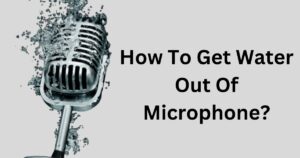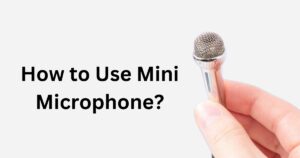Microphones, like other electronic devices, need power input to function.
Do Microphones need battery? These are of different types, and each type needs different sources of power. Not all mics need batteries.
Do microphones have batteries? Only Battery Operated Microphones use and have batteries. These batteries are generally rechargeable and you won’t have to recharge them for a good amount of time.
So what are battery-operated microphones? In general, battery-operated microphones are wireless. Plus, the inbuilt rechargeable battery inside it helps you record for a long-time, without worrying about a power cut.
In this post, we will help you understand whether mics necessarily need batteries to function and the pros and cons of using battery-operated mics.
Mics that run on batteries
There are two kinds of battery-operated active mics that you should know of. The first variety is the wireless mics that have battery-generated wireless transmitters. These mics often contain a condenser capsule, and the batteries supply DC bias voltage to the internal preamp.
For example, we can think about portable Lavalier, handheld, or headset mics. The second variety consists of the mics which run on batteries besides working on phantom power. Condenser microphones are a good example of it.
The batteries are designed to supply polarizing or preamp power to the battery-powered studio mics. In this situation, batteries act similarly to phantom power.
If you are confused regarding what batteries to choose for such mics, we suggest that you use AA Alkaline batteries. These batteries produce around 1.5V in new condition. They are readily available, convenient, cost-effective, and have a long, reliable operating life.
Mics that do not need batteries
While certain active mics require batteries, other active mics run on different sources of power such as phantom power, DC bias voltage, external power supplies, and USB power. Also, the majority of dynamic mics are passive and run on electricity produced by the internal magnetic field. Hence it is very clear that all mics do not need batteries.
The pros and cons of battery-operated mics
Let us now look into the pros and cons of battery-operated mics.
Pros
- Simple to set up
Battery-powered mics are easy to set up and power on. There is no requirement for connecting it to the recording device using cables. You just need to charge the mic fully and switch it on to start recording. Thus, the time you spent setting it up is no time wasted during a shooting.
- Simple to mount
During shooting, a battery-operated wireless mic helps you to be creative as it can be flexibly used and placed near the target audio. Plus, you can carry the mic around, keeping the camera static while shooting.
Cons
- The compulsion of full charging
In the event of prolonged recording, it is a must that you recharge the battery-operated mic to its full capacity. A discharging mic can be a real pain during continuous recording.
- Paused recording
Battery-operated mics are not capable of recording continuously with a single charge. In the middle of recording, if you see your mic forced to pause on its own, it may be due to discharged battery.
Do wired microphones have batteries?
Wireless microphones do have batteries. In addition to supplying the wireless transmitter with power, wireless mics often require batteries to power their pre-amps and impedance converters.
How are microphones powered?
The cable delivering audio and power to a mic is typically the same one used to carry the audio to the mic. In addition to phantom power, DC biasing, T-power, and USB power, there are several other types of power. External power supply units also have additional pins for carrying power, although these cables typically have additional pins for data transmission.
The various microphone powering methods are:
The various microphone powering methods are:
- Plug-in power
- USB-power
- Batteries
- Phantom power
- DC biasing
- T-power (A-B power)
- External power supply units
What microphone requires a battery?
Generally speaking Wireless microphones and studio microphones require battery to operate.
- There is often a DC bias supplied by the battery to the mic pre-amplifier/impedance converter on wireless microphones. This also includes Bluetooth and karaoke mics.
- There are studio microphones that are battery-powered as well as phantom-powered.
How do you charge a microphone battery?
Microphone’s batteries cannot be charged directly. You have to connect the microphone to the power source using which a battery powered microphone gets charged.
Let’s see how to charge the battery using the microphone.
How to charge a microphone
Let’s see how to charge a wireless microphone. These steps also apply for karaoke or Bluetooth microphones.
Turn off the microphone before charging
Turning off a microphone is the first thing you need to do before charging it. It is very important to switch it off so that other parts and instruments in the same power system will not be damaged as well. By pressing the designated button on the microphone, it can be turned off.
Connect the mic to a power source
In order to charge a microphone, the next step is to connect it to a power source. Removing the microphone connector cover allows you to find the USB port. In some cases, it may be challenging to identify the USB port on the microphone, in which case you must carefully read the user manual.
Connect the device to a charger after finding the USB port on an active computer by using a USB port. Since most microphones show red as a charging signal, you are almost right on how to charge a microphone.
Disconnect Once Charged
Typically the case of the microphone will have a mostly blue led light which indicates when it is fully charged or the light may go off when it does. In either case, an alert will appear when this happens so disconnect the microphone at this point since it is full and ready to be used.
Most wireless microphones, including bonaok and karaoke microphones, can be charged using these three simple steps.
Factors affecting Battery Life
A microphone’s battery life can be affected by a variety of factors. There are many factors that can affect the quality of a microphone, including the type, brand, battery, and even the environment.
Handheld microphones have a shorter battery life than headsets or lavalier microphones. Handheld microphones consume a lot more power than regular microphones. Battery life can also be affected by the brand of microphone. The batteries used by some brands last longer than those used by others because they are of a higher quality.
It is also important to consider the quality of the battery. Battery quality determines how long a battery will last. Battery life can also be affected by the environment. The battery drains faster when it’s cold outside. Batteries last longer in hot weather.
How long does the charge of microphone battery lasts?
Generally, a microphone battery will last about 3-4 hours when used continuously.
Conclusion
Battery-operated mics are becoming increasingly popular as they are user-friendly and highly portable. If you are a beginner, you might find it extremely easy to use because of its simple technology. Additionally, it is possible to record audio comfortably regardless of the situation as they are generally wireless.

![Do Microphones Need Battery? Do they need it? [Explained]](/wp-content/uploads/2022/07/Do-Microphones-Need-Battery-Do-they-need-it-Explained.jpg)


